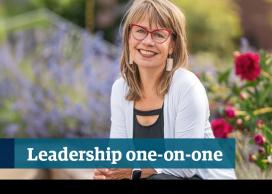Dr. Janice Stewart is UBC's Deputy Provost, providing strategic leadership and oversight for academic affairs, faculty recruitment and retention, and ongoing faculty relations matters. They also support the Provost and Vice-President, Academic, UBC Vancouver, in ensuring the realization of the university’s strategic academic aspirations.
Prior to this role, Janice served as Associate Dean, Faculty, in the Faculty of Arts. Janice is a professor at the Institute for Gender, Race, Sexuality and Social Justice – where they received the Killam Teaching Prize in 2009/10. Their academic interests include critical theory, gender theory, anti-racist work, and Modernist writers such as Virginia Woolf and Emily Carr.
Outside of work, Janice is actively involved with CampOUT, a leadership and learning summer camp for queer, trans, Two-Spirit, questioning, and allied youth from across BC and the Yukon.
Q1. What quality do you most admire in a leader?
JS: I admire leaders who are thoughtfully courageous, and I look for it in everyone that I work with. When you’re making decisions that will affect many people, you’re taking a risk. It’s important to deeply understand every situation – what people are doing, what’s important to them, and where they want to see change – before moving forward. Leadership is a collaborative and consultative process, and I admire those who take a considered approach in everything that they do.
Q2. What makes you laugh?
JS: I love people and laughing with them about everyday interactions or the obscurity of life. Work can be stressful and sharing time and space to laugh with colleagues about the human condition can be a release valve.
Q3. Who inspires you, and why?
JS: I am inspired by Agnes Macphail, the first woman elected to the House of Commons. She was born in rural Ontario, grew up on a farm and eventually joined the United Farm Women of Ontario in the 1920s. Having lived on a farm in Strathroy, Ontario, I developed an appreciation for farm women, the contributions they’ve made, and how they are represented in Canadian history. Agnes fought for labour rights and reforms that included women in the broad workforce of Canada early on, supporting and advocating for farm women to have security, benefits, and equal pay.
Q4. For you, what makes UBC different?
JS: UBC is full of colleagues who are hardworking, curious, and trying to solve the world’s problems – whether it is in climate action or sustainability, equity, and Indigenous rights. We lead on many fronts in breaking down barriers.
Q5. What is the most important lesson you’ve learned, in your career to date?
JS: It’s important to approach situations with kindness, compassion, and love. When someone shares an idea, I believe the right response is to listen to what is being said and what is needed from that perspective – to try and understand why it matters to them. People are wonderful and fragile and I’ve realized the most important lesson in any job is to meet others with empathy and care.
Q6. How do you like to recharge?
JS: I like to go to an ocean spot along the Pacific Northwest coast where there are very few people and spend time with my partner, Mary Bryson, and our two silken windhound dogs. I love to sit by the ocean and walk for miles on the beach. We take our time to relax and decompress, make divine food, chat, laugh, and read books.
Q7. What is the best advice you were ever given?
JS: Take time off to disconnect. It’s advice that people have given to me and something I advise others as well. In the 24 years that I’ve been at UBC, I have rarely taken all of my holidays. I tend to keep working a little bit here and there – but I now prioritize rest more routinely because I’ve felt the benefits firsthand. When I take time off, I gain a new perspective, get a bit wiser, and think more broadly.
Q8. What do you value in your colleagues?
JS: I value curiosity. I’m extremely curious about the world and I feel inspired when my colleagues share what they’re passionate about, whether it is about the reproductive system of a fruit fly, organizing for future scenarios and how to get ready for them, or creating a vision for teaching and learning. If something is captivating them, I want to know what it is. I also value people who are kind and considerate and engage ethically with the world and each other.
Q9. What do you hope will be your lasting impact at UBC?
JS: In my current role, I support the Provost in focusing UBC’s academic mission through an equity lens and oversee faculty engagement across the university. I hope that by the time I retire, I will have improved systems for the betterment of people at the university.
I also have political commitments to being visible as a queer person in a leadership role. As someone who uses ‘they/them’ pronouns, I think inspiring and empowering others who may not see themselves reflected in leadership positions is extremely important to me.
Q10. If you could have a super power, what would it be?
JS: I would love to be a polyglot, and speak with people in their own language. I can speak French – I’ve lived in Quebec and travelled in France – but I wish I could speak many more languages. When you speak another language, you can understand colloquialisms, the power of certain concepts, and differences in regional culture.
Q11. Looking back, how have your academic pursuits influenced your approach as Deputy Provost?
JS: At the heart of everything that I do, I lead with curiosity. My academic pursuits are extremely eclectic and always growing. I’ve been interested in many subjects as an academic – from writers like Virginia Woolf, Radclyffe Hall, and Emily Carr, to critical theory, psychoanalysis, and philosophy, to political and academic work on equity and social justice.
I’ve transferred that intellectual curiosity from abstract academic subjects to concrete policies that affect people. The university is governed by a very old system that has been reproducing itself for a long time – but our policies and plans have to be living documents that support the experiences of the people here. I believe that social justice is fundamental to how we think about all things for people to feel welcome, respected, and cared for at the university. As Deputy Provost, I’m here to listen and support faculty members and their well-being throughout their academic careers, and to make space for the changes that are being asked of us.
Q12. How do you hope to support the faculty community in the next five years?
JS: Listening is the gateway to comprehending what is at stake and what comes next. For me, it’s listening to learn if the problem affects one person or many, or if it’s something more systematic, which requires a bigger, broader change. Some changes take a long time.
I’m looking forward to the University Bargaining for Faculty, which expires in 2025 – this will be an opportunity to think deeply about the Collective Agreement. As a faculty member, I love working with colleagues to find out what people are prioritizing, ensuring it’s included in the conversation, and coming out with something that represents the current needs of our faculty community.
Over the next five years, I’d like to work with the Provost to make some processes a little easier, friendlier, and lighter for the people involved, whether it’s the individuals being interviewed for leadership roles or the committees and groups that are part of this consultative process. We have such great people at UBC – not just faculty, but staff as well – and it’s important to me that they enjoy their time here.
Published: September 9, 2024
Interviewed by: Alpha Lam, UBC Internal Communications



